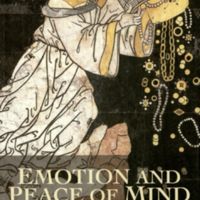Emotion and Peace of Mind: From Stoic Agitation to Christian Temptation
Dublin Core
Title
Emotion and Peace of Mind: From Stoic Agitation to Christian Temptation
Description
"Richard Sorabji presents a study of ancient Greek views of the emotions and their influence on subsequent theories and attitudes, pagan and Christian. The central focus of the book is the Stoics, but Sorabji draws on a vast range of texts to give a rich historical survey of how Western thinking about this central aspect of human nature developed." "Stoicism is not, Sorabji makes clear, about gritting your teeth. It can successfully banish stress by showing you how to assess your situation differently. But there were rival views, that emotional stress depends on irrational forces in the mind, or, as modern brain research explains, physical forces in the body, so that changing your assessment is only sometimes effective. The debate also concerns the different roles of philosophy, music, and the arts in calming stress." "Orthodox Stoics marginalized as mere side-effects the initial agitations which they could not treat. In Christianity we see how one culture can transform another. Sorabji shows how the Christians turned the Stoic theory of initial agitations into a theory of initial temptations and devised new techniques to combat what came to be called the seven cardinal sins." "Emotion and Peace of Mind is a magisterial work of scholarship which will be fascinating for anyone with an interest in the emotions from a historical or contemporary perspective."--Jacket.
Creator
Richard Sorabji
Publisher
Oxford : Clarendon Press
Table Of Contents
I. Emotions as Judgements Versus Irrational Forces -- 1. Emotion as Cognitive and its Therapy -- 2. Emotions as Value Judgements in Chrysippus -- 3. Seneca's Defence: Third Movements as Harmonizing Chrysippus and Zeno -- 4. Seneca's Defence: First Movements as Answering Posidonius -- 5. Arts: First Movements and Controversies on Drama and Music. Aristotle, Philodemus, and the Stoics -- 6. Posidonius on the Irrational Forces in Emotion: Galen's Report -- 7. Posidonius: Judgements Insufficient for Emotion. Exhaustion and Lack of Imagination -- 8. Posidonius: Judgements Not Necessary for Emotion. Disowned Judgements, Animals, Music -- 9. Aspasius and Other Objections of Chrysippus -- 10. What is Missing from the Judgemental Analysis? Brain Research and Limitations on Stoic Cognitive Therapy -- II. Value of the Emotions, Cognitive Therapy, and the Role of Philosophy -- 11. Role of Analytic Philosophy in Stoic Cognitive Therapy -- 12. Stoic Indifference: A Barrier to Therapy? -- 13. Case for and against Eradication of Emotion -- 14. Traditions of Moderation and Eradication -- 15. How the Ancient Exercises Work -- 16. Exercises Concerned with Time and the Self -- 17. Physiology and the Non-Cognitive: Galen's Alternative Approach to Emotion -- 18. Sex, Love, and Marriage in Pagan Philosophy and the Use of Catharsis -- 19. Catharsis and the Classification of Therapies -- III. Emotional Conflict and Structure of the Mind -- 20. Emotional Conflict and the Divided Self -- 21. Concept of Will -- IV. From Stoic Agitations to Christian Temptations -- 22. First Movements as Bad Thoughts: Origen and his Legacy -- 23. From First Movements to the Seven Cardinal Sins: Evagrius -- 24. First Movements in Augustine: Adaptation and Misunderstanding -- 25. Christians on Moderation versus Eradication -- 26. Augustine on Lust and the Will.
Text Item Type Metadata
Original Format
Book
Citation
Richard Sorabji, “Emotion and Peace of Mind: From Stoic Agitation to Christian Temptation,” Humanities Hub, accessed February 27, 2026, https://humanitieshub.sdsu.edu/omeka/items/show/1453.


